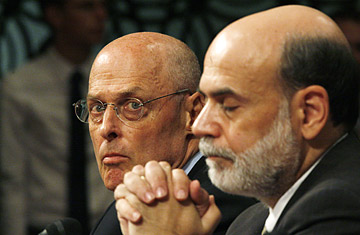
Treasury Secretary Henry Paulson, left, and Federal Reserve Chairman Ben Bernanke are seated at the witness table on Capitol Hill during a Senate Banking Committee hearing
(2 of 2)
To be sure, there's no shortage of grousing on Capitol Hill on both sides of the aisle. Democrats are happy to paint Republicans and the Bush Administration as disproportionately interested in Wall Street fat cats. But the Dems also know that they can come out on top by passing, with some alterations, a plan that is fundamentally in line with their philosophical approach to government regulation of the market. Republicans, for their part, quietly hate the proposal but can't get in the way of it this close to an election. "They think the market's going to melt down and we're going to get blamed," says the disgruntled GOP staffer, "so they're going to take their usual chicken-s___ approach and vote for it."
Not everyone will go along. A bloc on the far right of the Republican Party will say no because they are philosophically against it (and because they are from securely red districts or states); Kentucky Senator Jim Bunning, using his typically heightened rhetoric, went so far as to call the proposal "un-American." And a group on the left will oppose it because they see it as a bailout for Wall Street executives (and because they're from securely blue districts or states). But it seems clear that Paulson and Bernanke managed to hit the mark with their three pages. And even if dozens more are eventually added to sweeten the pot for important constituents with powerful lobbyists, the core of the project will remain the same. It's what members of Congress do, even if, as the GOP staffer says, "Not a single goddam one of them could explain what's in the thing."
